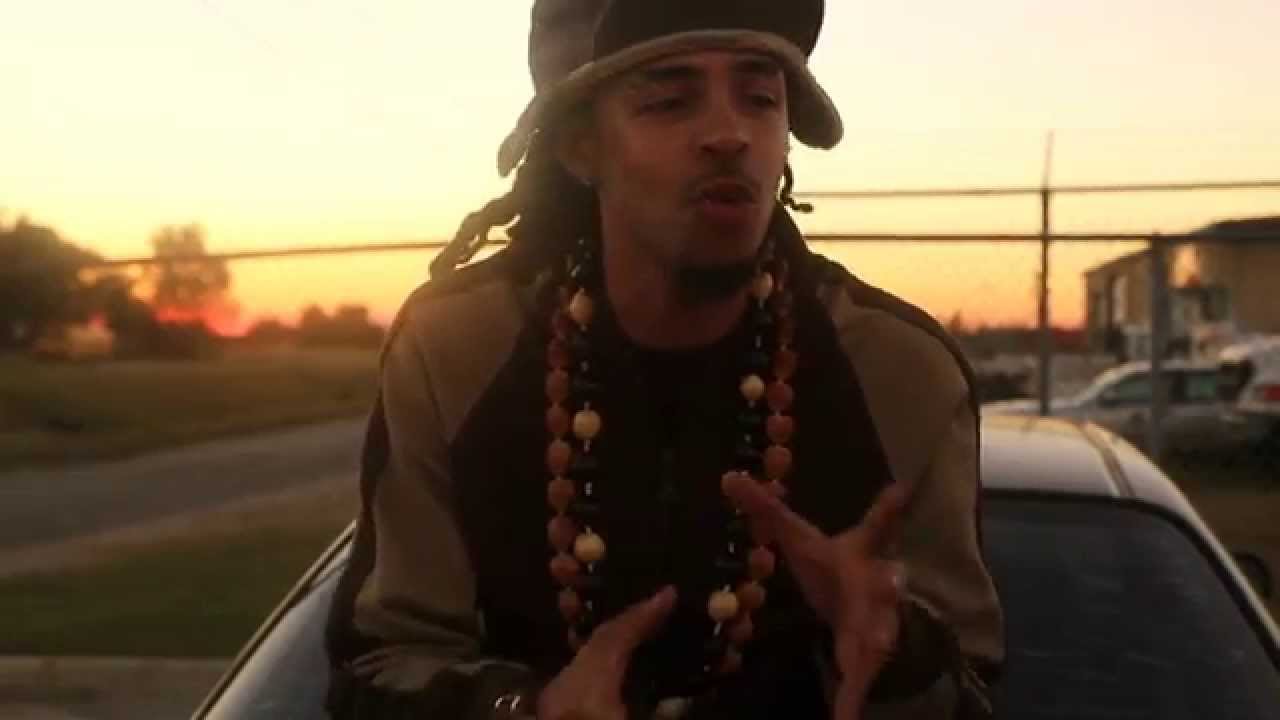“[I am a] dedicated father and believer, rappity rapping wrestling enthusiast, and fashion aficionado.”
When Armond was a teenager, he had a recurring theme in his music of waking people up. In 2010, he released an album called Dreaming Out Loud, with the theme being “Armond, wake up.” After his 2013 album Kairos, his DJ said “Why aren’t you called Armond WakeUp?” Armond did not have an answer. His DJ said “Your job is to wake the people up. That’s what you do, so go by Armond WakeUp.”
Growing up, Armond’s family was not religious, but when he spent time with his grandmothers in the summer they would take him to church. “We didn’t have no concept of what that really was.”
“I was rapping since I was seven years old and I put the pen down around thirteen and picked it back up when I was sixteen after a friend committed suicide. That friend of mine always tried to get me to rap.” Armond said this was before rapping was cool, and that he was one of four at his school who rapped. He went out to parties to battle rap, “and I would be in these environments where there were like drugs and gangs and alcohol and all that stuff and I never engaged in it.”
He had friends who were in gangs, but they did not want to let him into that life.
“There were times when it was like, we would get shot at and it never touched me. I always knew the hand of the Lord was on my life before then.”
After graduating high school, Armond joined the Air Force and while in basic training, “everything just went crazy. My sister ended up giving her life to the Lord a year prior and my sister and I are best friends.” His sister would write him letters regularly to tell him about what’s going on back home. One of her friends repeatedly sent him letters encouraging him to give his life to Christ.
“I also had people in my flight in basic training who were also believers as well and we would sit there and talk and after lights out we would break down the bible.”
Following basic training, Armond wanted to be stationed in the U.S., but was sent to Okinawa, Japan. He believes that God sent him away from what he is familiar with to be alone. His parents got divorced and he encountered several family tragedies, leading up to a personal crisis.
“I woke up one morning and my eye was swollen shut.”
He called the emergency line to request an ambulance, but they said that his symptoms did not warrant that. “My best friend takes me to the hospital and I’m in the hospital for two weeks. Nobody knew: my family didn’t know.”
Armond had an infection in his nasal passage that almost reached his brain, but the doctors explained that “the eye swelling was basically a blessing in disguise cause had that not happened, the infection would’ve gotten in my brain and I would’ve been a vegetable [vegetative].” Armond was alone in a quarantined room for two weeks and “I pretty much did the ‘Hey God, um, if you get me out of this, I’ll try you out.’”
Fast forward to 2017, and he has a new EP called 40 Days. In the four years since his last release “God kind of like has really been dealing with me on a really crazy, deep level. Trying to purge and me resisting that purge.” He says that people learn to live with their sins and their idols and not think that those sins are taking away from their relationship with God.
In Matthew 4, Jesus went out into the wilderness for forty days and nights where he was tempted by the devil. “When you read that chapter, you only hear about Him being in the wilderness for eleven verses. He goes up to the mountain to fast, He gets tempted by Satan, angels minister to Him [and] by the time He comes back, He is back doing the will of the Father.”
Armond has wondered what each of those days could have been like for Jesus. “I began to see myself in that, like, when God began to purge and deal with the reality of me, it was really ugly and I experienced a lot of that stuff. I feel like I’ve been on my own island in the wilderness watching things, life, and the world pass me by while God was getting me ready for this season.” In 40 Days, Armond gives thorough introspection of his own life to the listener.
“The Mourning is probably the hardest song to listen to because it’s a depressing song. I’m letting go of all this stuff. I’m dealing with wrong perceptions and mistakes that I’ve made and people that I’ve let down.” Despite mourning the difficulties of life, Armond appreciates the hardships he faces because he knows that they are purging his sin and making him more pure and holy.
“Sometimes the redemption is in worship and its filled with glory and it’s this amazing, wonderful thing and sometimes it’s like hanging on by a thread, like ‘God I really want to let go of this, but I know that You’re gonna get glory out of this.’”
He believes that through our trials we have redeeming ends and that we need to persevere and remain faithful during the hard times.
The following song, “The Hold,” asks people why they are holding onto their sins which are keeping them from God. “The funny part is when you finally let go of it and it comes back around, you’re like, ‘Oh my God, this is what I was holding onto? Really?’”
“Their God is humanity. Their royalty is vanity. Their genius is a blasphemy. Jesus is a masterpiece.”
That is the hook to “The Vanity” and “it’s basically me going at the world system. Things that the world esteems as great, getting the mind of Christ would make you look at those things and be like, [nasty face] that’s kind of trash.” Armond says that people who follow the world’s model of success will end up empty, but deeds that a person does for Christ will last in eternity.
“We should be the ones setting the trends. We should be the ones leading the charge. We should be the first ones being creative if we serve the God of creativity.”
Armond says that feelings are fleeting, so we need to be careful concerning acting on impulse. Concerning the forty days in the wilderness, he said we can see a path away from God as an easy way to rest from a trying time, but that would be a poor decision. “I always say, if you’re a Christian, and you don’t have a faith crisis, or like ten, you’re not really a Christian because God will purposely walk us through stuff that makes us say ‘I don’t wanna do this anymore.’”
“The Feels” encourages people that when they feel down, when they feel like everything is going against then, they must persevere to follow Christ. “The Holy Spirit gives us the ability to look past that and move forward in a way that unbelievers can’t.”
The final, climactic song on 40 Days is “The Worth” and “it’s coming out the woods at the end of forty days. I’ve purged, I’ve let things go. I’ve allowed God to change my perspective on things and now I’m just grateful that I did it.” The song is a song of praise, which is not a common theme in Christian hip-hop. “I never thought that you could worship to hip-hop until God gave me hip-hop records that worshipped Him.”
Next month, Armond will be releasing a full-length album called Even If I Lose, inspired by Romans 8:28, “And we know that in all things God works for the good of those who love him, who have been called according to his purpose.” (NIV)
“If you’ve answered the call of Christ that means you’re called. That means whatever you’re going through, all things work together, and that means if you believe that you’re called, and if you believe that all things work together, then that means you love God.”
Armond says that believers ultimately think differently than non-Christians. “We win when we lose. The world will look at a mistake as something that’s unforgivable, but the redemptive blood of Christ makes our losses wins.”
“Anything you do unto the Lord, you have the ability to be so dope at it because there’s so many ways you can go with it.”
You can follow Armond WakeUp on Facebook, Twitter, and Instagram.
You can get 40 Days on iTunes, Amazon, or Google Play. You can listen on Spotify.





